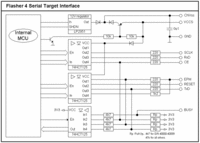Fascinating Technological Advancements
Penny's motorcycle, a 1983 Honda VF750S, is pretty much awesome. It's all fast and everything, and complicated, and ancient, so while everything technically still works, nothing works quite the way it did when the bike was brand new, which only serves to make it more exciting.
For instance: the carburetors. They're sort of clogged, but not totally, so the bike will idle smoothly, and it'll blast down the road like you're a crazed maniac, but there's some trouble with the in-between stages. ...You're cruising; you're cruising; you're cruising; you're SCREAMING UP THE TAILPIPE of the unsuspecting Camry in front of you. I can't believe this is the bike Penelope learned on.
One neat and still-functional feature of the Sabre is the self-cancelling turn signals. I'd bet most car drivers never gave it much thought, but it's a little tricky getting turn signals to turn themselves off automatically on a vehicle with no steering wheel. As a result, it was decades before any bike had this feature, and most still don't.
The way it works is... well, to tell you the truth I think it's magic. But the manual says there's a sensor on the front of the frame that senses when the front wheel deviates from being pointed straight ahead. In addition, there's a speed/distance calculator that runs off the main gauges, constantly tabulating how far you've gone since activating the turn signal. This enables timely cancellation, even in sweeping turns where the handlebars don't actually move. The computer compares inputs from these two sources and makes its decision, activating a relay that stops the blinkers and returns the switch to its center position. Every time you signal a turn. For 23 years.
I envision the necessary circuitry for this feat as looking about like this:
This is in contrast to all the other motorcycles I've ridden, which employ a different system for cancelling the turn signals:
Both work pretty well. But it's always nice to see what can be accomplished when you turn some engineers loose on a problem.



No comments:
Post a Comment